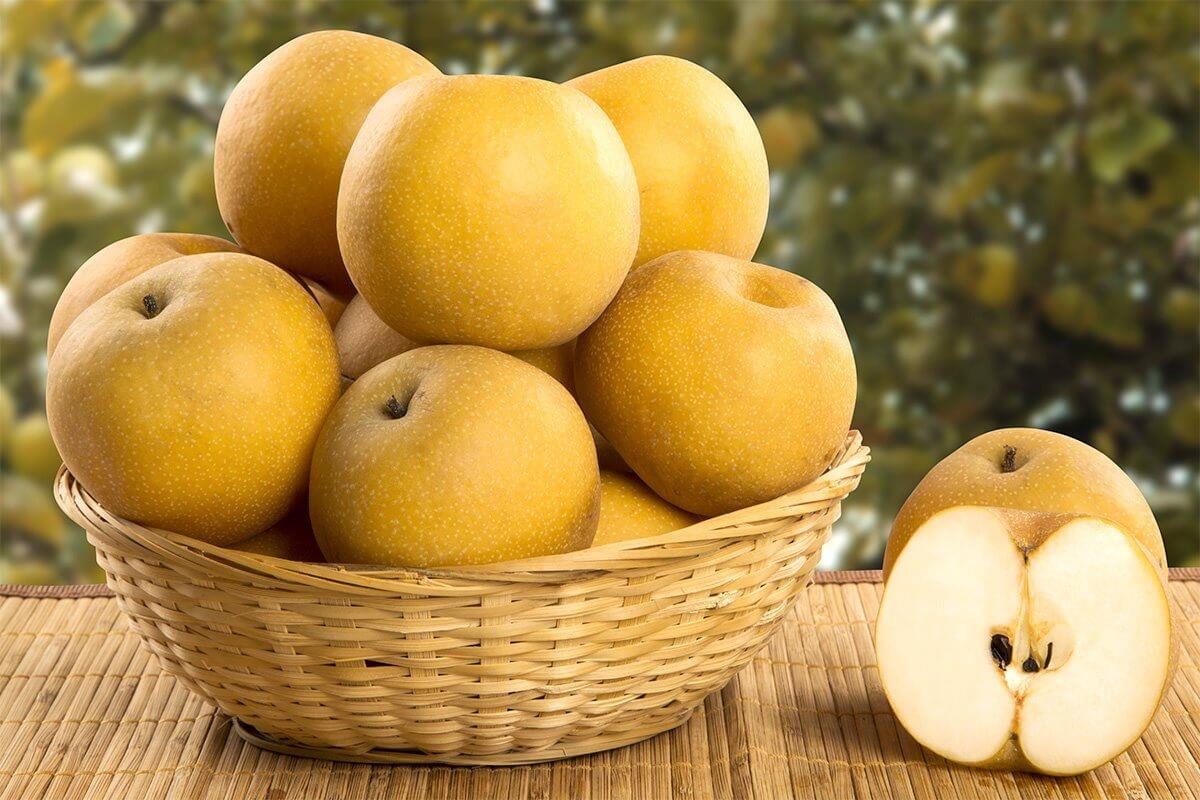Pears are a very suitable fruit to help solve problems in autumn and winter weather such as cough, thirst, dry skin, nosebleeds... but there are cases that need special attention when using.
Health benefits of pears
Pear is a juicy fruit, sweet, delicious and especially rich in nutrients. According to Oriental medicine, pear is sweet, slightly sour, cold, and affects the lungs and stomach.
Pear has the effects of moistening the lungs and conscience, eliminating phlegm and reducing fire, quenching thirst and relieving alcohol, benefiting the large and small intestines, treating typhoid fever, cough, asthma caused by heat and phlegm, heat diseases that damage body fluids, thirst, and relieving alcohol after drinking alcohol.
Modern research also shows that every 100g of pear (the flesh of the fruit) contains 85% water and many nutrients necessary for the body such as protein, fat, carbohydrates. In addition, there are minerals such as calcium, phosphorus, iron, vitamins such as vitamin A, B1, B2, C along with organic acids such as citric acid, malic acid.
Pharmacological studies show that pears contain glycosides and tannins that have the effect of moistening the lungs, reducing coughs, dissolving phlegm, and enriching the blood. Regular consumption of pears can reduce symptoms of dry, sore throat, hoarseness, thick phlegm, constipation, and red urine, helping to relieve symptoms and promote recovery.
Pears also have the effect of lowering blood pressure and calming the nerves. People with high blood pressure or heart disease due to excess liver yang or liver fire can eat pears to lower blood pressure, helping to reduce dizziness, lightheadedness, and palpitations.

Pears contain lots of water and nutrients that are good for your health.
Pears also promote gastric acid secretion, protect the liver, aid digestion, and increase appetite. Patients with hepatitis and cirrhosis who regularly eat pears can improve their appetite and improve their spirits.
Some healthy dishes from pears
Pear porridge
Pear porridge is introduced in the book Holy Wisdom Prescription - an ancient Eastern medicine book from the Northern Song Dynasty, highly appreciated by many medical practitioners from the past to the present.
How to cook:
- Wash pears, peel, remove seeds, squeeze out juice and set aside.
- Use the pear peel, pulp and seeds, boil water to get the juice, then add rice to cook porridge.
- When the porridge is cooked, add the squeezed pear juice and white sugar, boil for a while and then eat. Use once a day.
Uses: Moistens the lungs, dissolves phlegm, clears heat, produces body fluids... suitable for people with coughs due to lung heat or dry coughs, thirst due to heat illness or after drinking alcohol.
Red Wine Braised Pear
How to prepare: Peel the pears (2), remove the core and seeds, and slice them into bite-sized pieces. Put the pears in a pot, add red wine (100ml) and rock sugar (50g) and simmer for about 20 minutes.
Uses: This dish helps nourish the throat and makes the skin firm and smooth.
Stewed pears in honey
How to prepare : Wash 1kg of pears, remove seeds, slice, simmer until soft, add enough honey, boil into a paste, store in a jar. Drink 2-3 teaspoons each time with water, or chew and hold in the mouth.
Uses: This dish is very good for people with long-term fever, dehydration, thirst, diabetes, and coughing up blood.
Things to note when eating pears
- People with digestive problems : Pears are cold and damp, so people with weak spleen and stomach with symptoms such as bloating, poor digestion, loose stools, and who cannot eat cold foods should not eat a lot.
- Breastfeeding women: This case Children should not eat too many pears because their digestive systems are not yet fully developed. According to Oriental medicine, children's spleen and stomach are still immature. If mothers eat too many pears, which are cold foods, the cold air can enter the milk and affect the child's digestive function.
- Pregnant women: Pregnant women You should also eat less or not eat pears, the process of pregnancy and embryo formation is very important, cannot be taken lightly, foods that are cold or spicy should not be eaten much.
After giving birth, women have weak bodies, depleted blood and energy, are relatively inactive, and are afraid of wind and cold; pears are a cooling food so should be avoided.
- People with nocturia: Pears also have diuretic effects, so people who often urinate at night or urinate frequently should not eat too many pears.
- People with weak yang energy: Those who are often afraid of cold, often have loose stools, cold hands and feet should not eat a lot of pears. When eating, they should also process them into dishes, cook pears to prevent the symptoms of cold and dampness from becoming more severe.
In addition, when eating pears, you should not eat them with certain foods such as radishes, amaranth, goose meat... these foods when interacting with pears will cause negative effects on health.
Dr. Nguyen Huy Hoang
Source: https://giadinh.suckhoedoisong.vn/nhung-truong-hop-can-dac-biet-chu-y-khi-an-qua-le-172241104152908569.htm




















































![[Maritime News] More than 80% of global container shipping capacity is in the hands of MSC and major shipping alliances](https://vphoto.vietnam.vn/thumb/402x226/vietnam/resource/IMAGE/2025/7/16/6b4d586c984b4cbf8c5680352b9eaeb0)













































Comment (0)